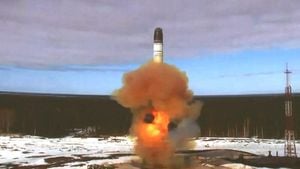US-China relations are once again under scrutiny, primarily due to increasing economic tensions and complex trade issues. Tensions have flared as the two economic giants grapple with tariffs, technology exports, and foreign investments, all of which are stirring up discussions on both sides. The recent nomination of investment banker Howard Lutnick by former President Donald Trump to lead key U.S. trade agencies adds even more pressure to these already boiling conditions.
Lutnick's connections to China are raising eyebrows, as his firms, BGC Group and Cantor Fitzgerald, maintain substantial ties with Chinese entities. This has prompted lawmakers and ethics experts to voice concerns about potential conflicts of interest, especially related to his ability to enforce tariffs or restrictions against China. The crux of the matter lies within the increasing scrutiny over how Lutnick would navigate trade tensions, especially when juxtaposed with his business interests.
At the core of the growing economic rivalry is the United States' approach to China’s rising influence. Recent events depict the U.S. attempting to assert itself on the international stage by tightening its grip on technology exports to prevent Chinese firms from acquiring sensitive technologies. This is particularly true when one considers the semiconductor industry, which has become a battleground for technological supremacy.
Joining the conversation is the Biden administration, which has continued to confront China's economic rise, implementing various measures targeting Chinese firms like Huawei and ZTE. These companies have faced significant scrutiny due to their close associations with the Chinese government, leading to fears about national security and espionage. All this raises serious questions about how Lutnick, if confirmed, would balance these concerns with his financial interests.
Howard Lutnick has publicly stated his willingness to divest from his business ties should he be confirmed. This is seen by some as attempting to soothe worries about his impartiality when it pertains to imposing sanctions or tariffs on China, but many are skeptical of how effective this promise will be. Observers are noting the potential repercussions if Lutnick's interests lead to perceived favoritism or leniency toward Chinese enterprises, especially at a time when the courts are full of disputes over trade practices.
The dynamics of U.S.-China relations extend beyond the financial sector. The geopolitical atmosphere is fraught with various tensions, from territorial disputes in the South China Sea to differing views on human rights issues. The U.S. has ramped up its support for Taiwan amid rising fears of China's aggressive posture toward the island, effectively making it another contentious point between the two nations.
U.S. trade policies have aimed to reduce dependency on Chinese imports by encouraging domestic manufacturing and supply chain reconfiguration. This aspect of the policy is seen as necessary to safeguard national interests, but it also creates friction with trading partners and has led to calls for re-evaluated approaches concerning not just China, but also allies like Europe and Japan.
Both nations are aware of their interconnected economies, which adds layers of complexity to any potential resolution of these tensions. China's economy has heavily relied on American technology and investments, and likewise, several industries within the U.S. benefit from Chinese manufacturing capabilities. This reported interdependency leads many experts to question whether the current route won't lead to a prolonged trade war harming both economies.
Meanwhile, global observers are paying close attention to how Lutnick's position might reshape trade relations. With China's economic influence seen as both a threat and opportunity, companies on both sides are carefully weighing their options for either expansion or retreat, depending on how policies evolve. Many American firms continue to edge closer to China, seeing the vast market potential ideated through various exploratory ventures.
Recent tariffs instituted by the United States on various Chinese goods aimed to level the playing field for U.S. manufacturers but have led to increased costs for consumers and firms alike. Economists argue these measures may backfire, as businesses struggle to absorb costs or find alternative suppliers leading to uncertainty. Lutnick himself might be positioned to influence whether tariffs remain or if negotiations could lead to different arrangements.
Potential trade agreements or easing of these economic restrictions could hinge on Lutnick's approach, should he take office. Observers wonder if any shifts may stem from his ability to navigate these delicate waters, especially pertinent as China has shown itself eager to retaliate against any perceived overreach by the U.S. Political momentum is building for Lutnick, but any missteps could have immediate consequences not just for U.S.-China relations but for global economic stability as well.
One point of contention is the handling of sensitive technology transfers. The U.S. government's stance, whereby advanced technologies are protected from being accessed by China, is increasingly being seen as a strategic necessity within the geopolitical chess game. Lutnick's likely stances on these matters will be closely monitored, especially with fears of espionage and intellectual property theft hanging thickly over trade discussions.
Should Lutnick proceed with confirmed roles within U.S. trade agencies, he might face calls for greater oversight over U.S. firms operating in China. Advocates for tighter regulations argue these companies need clearer guidelines to avoid the pitfalls of falling prey to the Chinese government's reach, especially as the government pushes for more surveillance and control over foreign businesses operating domestically.
The mixed-state of U.S.-China relations continues to evolve, fighting against historical precedents of cooperation which have fluctuated over the years since both engaged actively on economic realms. Many observers now cartoon the relationships as conceding toward more confrontational stances—distinctly diverging interests have made it harder to find common ground wherever amicability might have existed before.
Visibly, citizens of both nations have begun to feel the pinch of these economic tensions across consumer markets, industries, and supply chains. How Lutnick’s trade policies will reshape, redirect, or recalibrate these conditions will be pivotal, not just as they play out domestically within American markets, but concerning the broader global footprint of these two economic powers.
With the world closely watching, Lutnick's confirmation hearings are set to spark discussions around not just his past business engagements but also the fundamental future of U.S.-China relations. The stakes are undeniably high as pressures from various factions entwine economics with geopolitics, leading to questions about whether the two powers can forge paths toward mutual benefits or if they stride forward onto more adversarial grounds.
These upcoming months are anticipated as being significant ones for Lutnick, for U.S. trade policies, and for the relationship between the United States and China. Navigational waters are turbulent, and the course charted may determine the outcomes of thousands of businesses, consumers, and trade opportunities.



